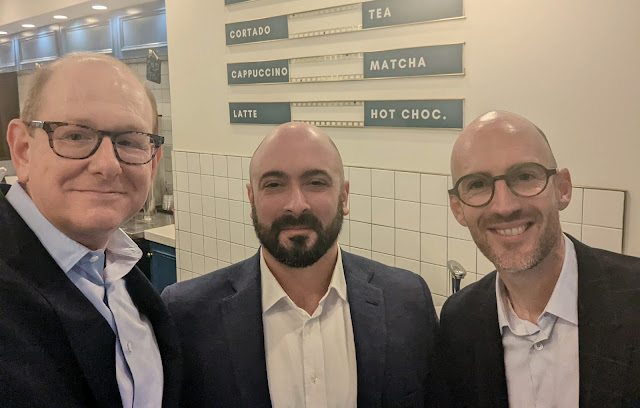- Spooky! CVS Health frightens all but one Humira biosimilar maker away from its formulary.
- Creepy! The gross-to-net bubble for anti-obesity GLP-1 drugs walks among us.
- Grotesque! Penn Medicine gorges on the 340B program.
- Vampiric! Rite Aid’s many management missteps finally put a stake in the company’s heart.
- Eerie! Mark Cuban Cost Plus Drug Company conjures a partnership with Alto Pharmacy.
P.S. For my daily haunting, join the zombie horde who shamble after me on LinkedIn. You can also find my ghostly rantings at @DrugChannels on Twitter/X. (I recommend LinkedIn for maximium scares. Alas, I’m still spooked by Threads.)
Advanced Control Specialty Pharmacy, CVS Health
Pharmacy benefit managers (PBMs) are starting to release their 2024 formularies, which will of course include biosimilars of AbbVie’s Humira. For my overview of the market, see Four Crucial Questions about the Humira Biosimilar Price War.
The link above shows CVS Caremark’s 2024 formulary for self-administered autoimmune medications. Table 1 (starting on page 9) shows the following Humira-related preferred options:
According to IQVIA, there was almost no adoption of the first Humira biosimilar (Amgen’s Amjevita) by mid-2023. Let's see if the July 2023 launches move the needle.
The link above shows CVS Caremark’s 2024 formulary for self-administered autoimmune medications. Table 1 (starting on page 9) shows the following Humira-related preferred options:
- Humira
- Hyrimoz, the high-list-price Humira biosimilar from Sandoz
- adalimumab-adaz, the unbranded, low-list-price Humira biosimilar from Sandoz
According to IQVIA, there was almost no adoption of the first Humira biosimilar (Amgen’s Amjevita) by mid-2023. Let's see if the July 2023 launches move the needle.
Ozempic Boom Is an Opportunity for Health Insurers, The Wall Street Journal
Good news—if you’re a PBM. The gross-to-net bubble—the ever-growing dollar gap between sales at brand-name drugs' list prices and their sales at net prices after rebates and other reductions—has come to the booming anti-obesity GLP-1 market.
The Wall Street Journal highlights a recent American Enterprise Institute study, which estimated that net prices for these drugs are far below list prices. (See chart below.) The gross-to-net gap arises from a combination of PBM rebates and manufacturer out-of-pocket assistance.
Consequently, insured patients may be paying full price for a drug that is being sold to payers and PBMs with deep discounts. What’s more, many of those forecasting financial doom from these medications have focused on list prices, thereby vasty overstating the ultimate cost impact. Even the semi-reliable New York Times reluctantly noted the gross-to-net gap.
The Journal also notes:
The Wall Street Journal highlights a recent American Enterprise Institute study, which estimated that net prices for these drugs are far below list prices. (See chart below.) The gross-to-net gap arises from a combination of PBM rebates and manufacturer out-of-pocket assistance.
[Click to Enlarge]
Consequently, insured patients may be paying full price for a drug that is being sold to payers and PBMs with deep discounts. What’s more, many of those forecasting financial doom from these medications have focused on list prices, thereby vasty overstating the ultimate cost impact. Even the semi-reliable New York Times reluctantly noted the gross-to-net gap.
The Journal also notes:
“GLP-1s benefit PBMs via higher prescription volume, higher revenue per prescription and higher margin management programs that lead to a slightly positive earnings contribution, writes JPMorgan’s Gill. Going forward, she adds, increasing competition within the GLP-1 space creates an opportunity for PBMs to drive higher rebates and benefit from the rising cost trend.”I wonder how long it will take for the drug pricing flat earthers (#DPFE) to acknowledge these realities.
Flagship Penn hospital to get $86 million, the sixth-highest payout nationally, in Medicare drug settlement, Philadelphia Inquirer
In an unexpected admission, Penn Medicine revealed that it saved an astounding $717 million from the skyrocketing 340B Drug Pricing Program.
Sadly, this jackpot compares unfavorably with its charitable care, which amounted to a meager $38 million. The purported cost shortfall from providing services to eligible welfare recipients was a further $381 million.
As a nonprofit hospital, Penn Medicine has fundamental legal and statutory community benefit obligations. That’s why it provided $419 million in charity and undercompensated care. Any money from 340B discounts shouldn’t be double-counted to meet its fundamental spending requirements, as I noted back in 2019.
Penn Medicine, which has revenues of nearly $10 billion, sadly illustrates why the 340B program desperately needs reform. Millions of dollars are getting swallowed up by wealthy hospital systems that clearly don’t need to “stretch scarce resources” to support the safety net.
Yuck.
Sadly, this jackpot compares unfavorably with its charitable care, which amounted to a meager $38 million. The purported cost shortfall from providing services to eligible welfare recipients was a further $381 million.
As a nonprofit hospital, Penn Medicine has fundamental legal and statutory community benefit obligations. That’s why it provided $419 million in charity and undercompensated care. Any money from 340B discounts shouldn’t be double-counted to meet its fundamental spending requirements, as I noted back in 2019.
Penn Medicine, which has revenues of nearly $10 billion, sadly illustrates why the 340B program desperately needs reform. Millions of dollars are getting swallowed up by wealthy hospital systems that clearly don’t need to “stretch scarce resources” to support the safety net.
Yuck.
Rite Aid Files for Bankruptcy, Undone by Years of Losses, The Wall Street Journal
Poor beleaguered Rite Aid has finally succumbed to a bankruptcy filing. A tough retail pharmacy environment—reviewed in CVS Pharmacy Downsizes: 10 Industry Trends Driving the Retail Shakeout—finally caught up with years of mismanagement and bad decisions. The WSJ article nicely summarizes Rite Aid’s ignominious history.
Over the years, I have highlighted some of Rite Aid’s missteps here on Drug Channels. Two choice examples from the archives:
P.S. If you're interested in picking up a small PBM (slightly used), the auction for Elixir will take place on November 20, 2023.
Over the years, I have highlighted some of Rite Aid’s missteps here on Drug Channels. Two choice examples from the archives:
- 2006: Rite-Aid + Brooks-Eckerd: Will three wrongs make it Rite? (Lesson: If you tie two rocks together, they still won’t float.)
- 2017: Rite Aid’s PBM Strategy: Will Hope Triumph Over Experience?, which was accompanied by one of my favorite images. 😉
P.S. If you're interested in picking up a small PBM (slightly used), the auction for Elixir will take place on November 20, 2023.
Alto Pharmacy, Mark Cuban Cost Plus Drug Company Team Up to Deliver Hundreds of Low-Cost Medications to Patients Across the U.S., Business Wire
It’s always notable when two innovative drug channel companies get together. ICYMI, Alto Pharmacy has joined the Team Cuban Card network operated by the Mark Cuban Cost Plus Drug Company.
For a full analysis of the booming patient-paid prescription market, see Section 4.3. of DCI’s 2023 Economic Report on U.S. Pharmacies and Pharmacy Benefit Managers.
Full disclosure: I am a member of Alto Pharmacy’s board of advisors.
For a full analysis of the booming patient-paid prescription market, see Section 4.3. of DCI’s 2023 Economic Report on U.S. Pharmacies and Pharmacy Benefit Managers.
Full disclosure: I am a member of Alto Pharmacy’s board of advisors.
Drug Channel Expert Meetup, LinkedIn
I recently had a fantastic opportunity to hang out in NYC with two of my favorite drug channel experts: Antonio Ciaccia of 46brooklyn Research and Eric Percher of Nephron Research. As Antonio quipped: Just three dudes talking drug prices, Star Wars, and hair styling.



No comments:
Post a Comment